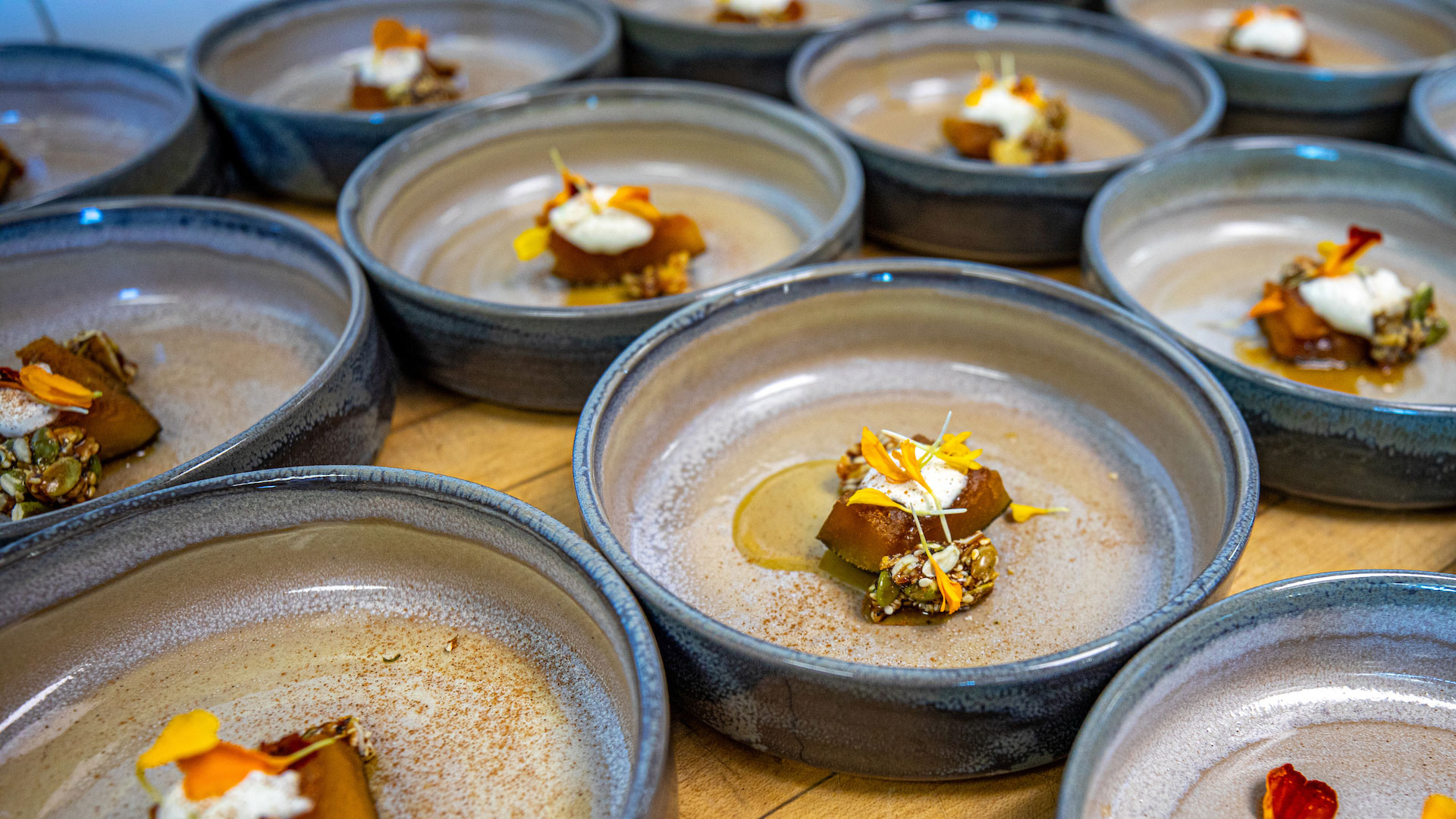Chef Chris Viaud '12 Celebrates His Haitian Roots
For Chef Chris Viaud '12, the process of finding his own culinary voice has meant exploring and reconnecting with his own Haitian heritage.
As he explained during his recent “Cook Along with JWU” segment (video below), he spent his formative post-graduation years working in primarily French kitchens, learning the techniques and classical (Eurocentric) approach to cooking. “I never really had the real understanding of who I wanted to become as a chef ... until some recent experiences that I had on Top Chef, where I learned that it’s okay for me to embrace and be proud of my heritage — and learn how to cook the food that I grew up eating.”
“Ansanm” is the Haitian Creole word for “together” — it’s also a monthly dinner pop-up that Viaud has been running at his flagship restaurant, Greenleaf, for roughly a year now. Ansanm is truly a labor of love that involves his entire family, inculding his mother Myrlene, father Chris, and sisters Katie and Kassie. (Meet them in this New Hampshire Chronicle segment.) “That was a whole journey just to bring my siblings together to learn about the food from my parents,” he explains. “I have a daughter now and I want to be able to pass that on from generation to generation — and I didn’t want that food and those traditions to become lost.”
As a 2022 James Beard Foundation Awards semifinalist for Emerging Chef, Viaud is intent on using his platform to expand palates — and perhaps minds — during his community dinners. “It’s just tremendous to see the amount of growth and support that we’ve gotten from the community to be able to do things like this,” he notes with obvious pride. “So it’s extremely special for me to be cooking one of these recipes from my mom today. I’m glad to be sharing with you — and hopefully making my family proud.”
“I have a daughter now and I want to be able to pass that on from generation to generation. I didn’t want that food and those traditions to become lost.”
About Haitian Cuisine
 Haitian food is a mix of African, French, indigenous Taíno, Latin American, Asian — “it has all these influences due to to the amount of slavery and slave trade ... coming in through the states,” Viaud explains. “One important thing to note about Haiti itself is that it became the first black republic in 1804.”
Haitian food is a mix of African, French, indigenous Taíno, Latin American, Asian — “it has all these influences due to to the amount of slavery and slave trade ... coming in through the states,” Viaud explains. “One important thing to note about Haiti itself is that it became the first black republic in 1804.”
For his segment, Viaud chose to make “Poule Nan Sos,” a classic of Haitian comfort food and a favorite in his family.
The chicken is marinated in epis, which Viaud calls “the go-to marinade in Haiti.” This mix of habanero peppers, multicolored bell peppers, garlic — a lot of garlic — olive oil, lime juice, scallions, parsley and thyme is “used for marinating a lot of our meats,” he notes. Epis is also used as a base for making rice, and for Soup Joumou, the celebrated dish that symbolizes Haitian independence from the French. “It’s kind of a joyous reminder of where we came from.”
Watch Chef Viaud’s #CookWithJWU Segment
“Cook with JWU” segments have offered up a unique opportunity to watch JWU alumni share not only recipes, but stories, tips and kitchen hacks learned from years of experience.
For his session, Chef Viaud chose a very personal recipe, but he also brought a wealth of advice that’s widely applicable in the kitchen. One example: Be careful about adding salt to a sauce or braise that’s in the process of reducing. “Once I remove the chicken, I’m going to reduce it down to make the sauce. So I don’t want to add any more salt just yet, because as it reduces, the salt will intensify in flavor and we don’t want to risk it becoming too salty,” he explains.
He also scores the chicken with a sharp knife. This is so the marinade will better penetrate the flesh, but also will help to ensure that the inside is cooking in the same timeframe as the outside.
For Chef Viaud, cooking is all about sharing. Finding his way to a better understanding of Haitian cuisine has been more than a passion project — it’s a family affair.
“Being able to reflect on my childhood and learn about these things that are so so sacred and not easily replicated really sparked the desire for me to continue to learn and grow,” Viaud explains. “I think I’ve made my parents proud along the way — representing the culture, doing it for our people and ... of course bringing our family back together, just as we would on any Sunday dinner that we’ve had together as a family.”
Recipe: “Poule Nan Sos” (Stewed Chicken in Creole Sauce)
Serves 2-4.
Ingredients:
● 4 chicken thighs
● 2 tablespoons lemon juice
● 1 tablespoon white vinegar
● 4 tablespoons epis (recipe below)
● 2 tablespoons adobo seasoning
● ½ teaspoon black pepper
● 1 chicken bouillon cube
● 2 teaspoons garlic powder
● Juice of ½ lime
● 6 parsley stems
● 6 sprigs thyme
● 8 whole cloves
● 1 red and 1 green bell pepper, sliced
● 1 small onion, sliced
● 1.5 tablepoons tomato paste
● Oil (enough to coat bottom of pan)
● Salt, to taste
Instructions:
- Remove skin from chicken and rinse with vinegar and lemon juice. Place the chicken in a large tall sided pan.
- Add the epis, adobo seasoning, black pepper, garlic powder, chicken bouillon cube, pinch of salt and lime juice and mix well.
- Make “bouquet garnis” with the parsley and thyme by wrapping with a piece of cooking twine. cut a side of the red pepper and stick the cloves in it. Add bouquet and cloved pepper to the pot.
- Add enough water to cover the chicken and bring to a boil to cook.
- After a few minutes, taste the water to make sure seasoning is ok. If more is needed, add more adobo and some salt (not too much). After a few minutes, taste again and repeat steps above if necessary.
- When the pot comes to a boil, pre-set your oven to broil on low/medium.
- Once chicken is cooked, take the thighs out of the water and place them on a sheet pan lined with foil. Carefully place in the oven and broil until golden-brown on all sides.
- While the chicken is in the oven, use the water it was cooked in to make the sauce. You may need to add some water if not enough in the pan.
- Add tomato paste and half of the onions and peppers to the water. Bring to a boil.
- Once chicken is ready, add them back to the sauce, let it boil for 5 minutes and then lower heat to medium-low.
- Add the rest of the peppers and onions, bring to a simmer for 15-20 minutes.
“Diri Kole ak Pwa” (Rice and Beans)
Ingredients:
● ½ cup kidney beans, soaked overnight
● 2 tablespoons neutral oil
● 1 tablespoon epis
● 2 teaspoons adobo seasoning
● 2 teaspoons garlic powder
● 1 tablespoon salt
● 1 cup basmati rice
Instructions:
- Place the soaked beans in a small sauce pot, cover with 4 cups of water and bring to a boil.
- Reduce the heat to a simmer and cook until tender, about 45-50 minutes
- While waiting for the beans to cook, place rice in a fine mesh strainer and rinse until the water runs clear. Set aside.
- Drain the beans and reserve the cooking water.
- Heat the oil in pan large enough to cook the rice, add epis and cook until slightly golden.
- Add the cooked kidney beans, adobo, garlic powder, salt and stir.
- Measure out 1 ½ cups of bean water; add it to the pan and bring to a boil. As soon as it begins to boil, add in the rinsed rice and gently stir.
- Reduce the heat to low and cover with a lid. Cook until the rice is tender and all the water has evaporated.
- Remove from heat and let sit before stirring.
Epis (Haitian Seasoning Blend & Marinade)
Yield: One cup.
● 2 scallions
● ½ cup of parsley
● ¼ cup of garlic cloves, peeled
● ¼ of a large onion
● 1 tablespoon thyme leaves
● ½ cup of mixed bell peppers (orange, red, green, yellow)
● ¼ habanero pepper
● 1/8 cup of olive oil
● Juice of ½ lime
● Salt to taste
Instructions:
- Add all ingredients to a blender and blend well.
- Taste and add additional salt if needed and blend again.
Related Reading
Follow Chef Viaud on Instagram.



